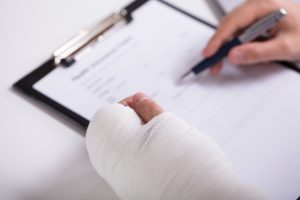 Injured victims often find themselves struggling with the financial burden that follows an accident. One essential aspect that may be overlooked in the chaotic aftermath is the requirement to mitigate damages.
Injured victims often find themselves struggling with the financial burden that follows an accident. One essential aspect that may be overlooked in the chaotic aftermath is the requirement to mitigate damages.
What Does “Mitigate Damages” Mean?
 To mitigate damages means that injured victims have a legal duty to minimize the harm caused after an injury by taking appropriate steps. In the context of a personal injury claim, this involves making reasonable efforts to reduce your losses and associated costs, including medical bills, lost wages, and other damages.
To mitigate damages means that injured victims have a legal duty to minimize the harm caused after an injury by taking appropriate steps. In the context of a personal injury claim, this involves making reasonable efforts to reduce your losses and associated costs, including medical bills, lost wages, and other damages.
By mitigating damages, you protect yourself from potential reductions in your compensation or even an insurance company outright denying your claim.
How To Mitigate Damages?
It’s vital to recognize that the process of mitigating damages begins right after the injury occurs. Here are three key steps you should be taking to safeguard your claim:
1. Seek Medical Attention Immediately
The first and most crucial thing to do after an injury is to seek immediate medical attention. This will not only identify potential injuries and lay the foundation for swift recovery, but it will also establish an official record of your injury and the steps you took to recover.
Documentation of your injuries is essential to your personal injury case as it proves the extent of the harm you experienced and ties it to your accident.
2. Follow Your Doctor’s Suggestions
Once you’ve received medical attention, follow your doctor’s advice carefully. Be diligent with appointment scheduling, medication intake, therapy attendance, and any other recommended treatments.
Establishing a record of adherence to treatment plans demonstrates that you’ve been proactive in your recovery and thereby minimizes the chances of your compensation being jeopardized.
3. Return to Work When Possible
Returning to work as soon as you can safely do so is an essential step in mitigating damages as it shows that you are not staying out of work attempting to collect lost wages unnecessarily. Your doctor can advise when it’s appropriate to return to work or provide guidelines for modified duties or temporary disability periods.
If You Don’t Mitigate Damages
Failing to take the necessary steps to mitigate damages can negatively impact your personal injury claim. Your compensation can be reduced as a consequence. In some cases, an insurance company may deny your claim altogether, arguing that you could have avoided losses but failed to do so.
How the Court Determines Your Efforts
When determining if you mitigated your damages sufficiently, the court will look at the following factors:
What Would a Reasonable Person Have Done?
The first factor the court will consider is what a reasonable person would have done in your situation. This doesn’t require you to make perfect decisions, but rather to act in a manner that most people would consider reasonable given the circumstances.
Some examples of reasonable actions include getting prompt medical attention, following the treatment plan prescribed by your doctor, and making efforts to return to work or find alternative employment if you’ve been unable to work due to your injuries.
When Did You Become Aware of Your Duty or Ability to Mitigate?
To satisfy the court that you’ve made genuine efforts to minimize your damages, you’ll need to demonstrate that you took action as soon as you become aware of your duty or your ability to take steps toward mitigation.
For example, if you didn’t immediately know that your injury required medical treatment, but sought help as soon as symptoms appeared, the court is more likely to consider your mitigation efforts reasonable.
Damages You Are Claiming Were Caused by the Accident
Finally, the court will examine the damages you’re claiming were directly caused by the accident. To ensure a fair and accurate assessment, it’s crucial to differentiate between damages that resulted from the accident itself and those that stemmed from your failure to mitigate.
For instance, if you were initially unable to work due to your injuries but failed to take steps toward finding alternative employment, the court may reduce your compensation accordingly.
Contact an Experienced Bowling Green Personal Injury Lawyer for Help With Your Case
 There are several advantages to seeking the assistance of a personal injury lawyer while trying to mitigate damages:
There are several advantages to seeking the assistance of a personal injury lawyer while trying to mitigate damages:
- Experienced Representation: Personal injury lawyers have handled numerous cases and are familiar with the tactics insurance companies use to deny or reduce claims. This knowledge can be invaluable in obtaining the settlement you deserve.
- Gathering evidence: Strong evidence is crucial to the success of your claim. A personal injury lawyer can help collect receipts, medical records, and other documents needed to prove your damages.
- Avoiding mistakes: A personal injury lawyer can guide you through the claims process, warn you against common pitfalls, and ensure you avoid making crucial mistakes that could jeopardize your claim.
- No Upfront Fees: Most personal injury lawyers work on a contingency basis, meaning they only get paid when they successfully secure a settlement or award on your behalf. This minimizes the financial risk to you and ensures your attorney is motivated to achieve the best possible outcome.
It’s important to work with an experienced personal injury lawyer to help you understand your duty to mitigate damages and to present a strong case for compensation. For help, contact Minner Vines Injury Lawyers, PLLC today to schedule a free consultation. Call us today at (859) 550-2900.